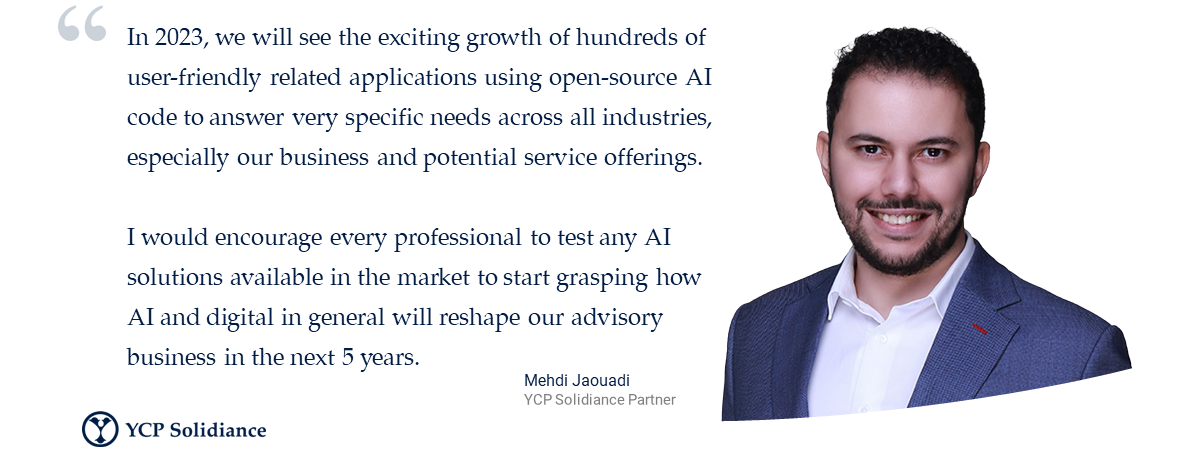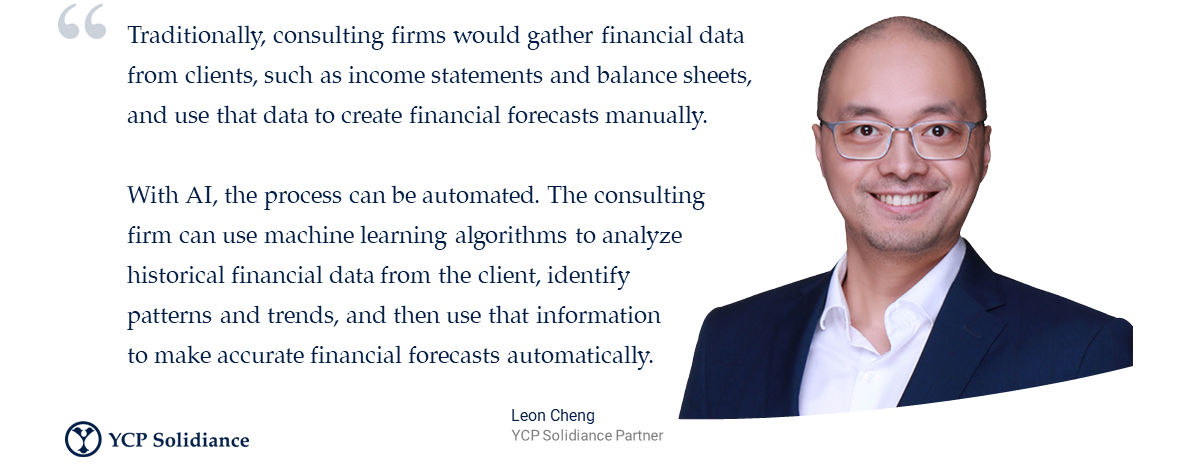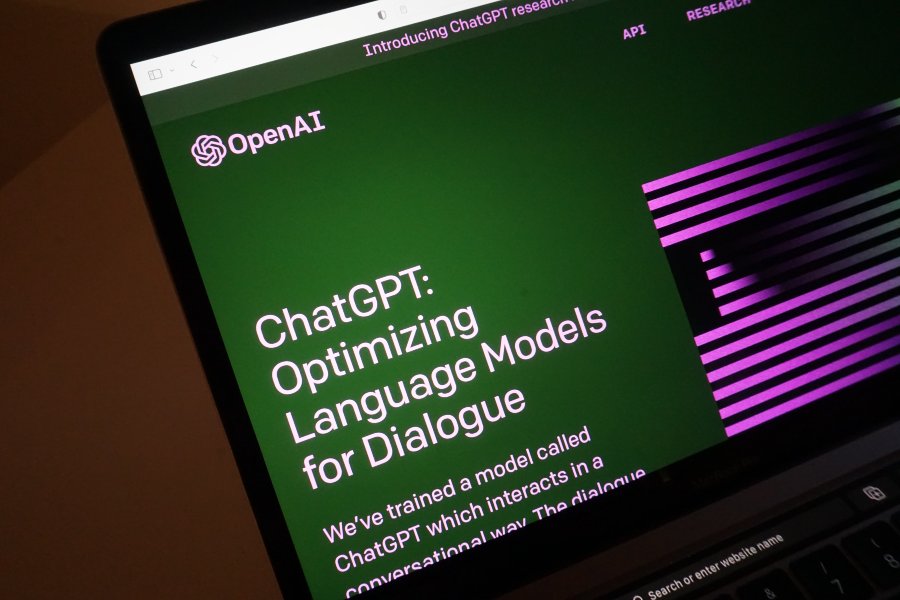Authors
Leon Cheng
Leon Cheng is a Partner for YCP based in the US office and Head of our Mobility Practice.
Mehdi Jaouadi
Mehdi is a Partner based in Thailand, with over 14 years of experience in strategy formulation, business development, and large-scale expansion growth within Automotive, FMCG, Healthcare, and other sectors.
With artificial intelligence (AI) becoming more prevalent, those in the professional service industry and beyond wonder how it will affect their business. We asked YCP Solidiance Partners Mehdi and Leon for their insight, as well as the source itself--here are a few excerpts from our "conversation" with the popular generative AI platform ChatGPT. To differentiate from human contributions, AI-generated sections will be italicized.
What is ChatGPT, and why is it becoming so popular?
ChatGPT is a highly advanced language model developed by OpenAI, capable of generating human-like responses to a wide range of questions and prompts. It became popular due to its ability to understand and respond to natural language input in a conversational manner, its massive training data, advanced training techniques, and public availability.
ChatGPT undoubtedly provides previously unseen convenience as users actively utilize the platform daily. But for many, the craze surrounding ChatGPT goes beyond its success in the short-term. The platform provides a glimpse of a future wherein smart technology and humans are becoming further integrated across society. Some even wonder if tools like ChatGPT can eventually replicate a human’s performance.
For business professionals, the emergence of ChatGPT brings forth a discussion on the long-term impact of smart technology like AI and how it will affect industries and sectors alike.

How will ChatGPT and similar platforms affect business industries and the job market for professionals
ChatGPT and similar language models are expected to have a significant impact on business industries and the job market for professionals in the coming years. Here are potential ways they could affect the job market:
- Automation: ChatGPT and other AI-powered platforms can automate many tasks that are currently performed by humans, such as customer service, data analysis, and content creation. This could lead to job displacement in some industries.
- New job roles: At the same time, the development and deployment of ChatGPT and AI could also create new job roles that require expertise in AI, data analysis, and other related fields.
- Increased efficiency: ChatGPT and AI can help businesses operate more efficiently, which could lead to increased productivity and job growth in some industries.
- Reskilling and upskilling: As AI becomes more prevalent, professionals may need to reskill or upskill to keep up with new job requirements and emerging opportunities.
Because of AI’s advantages, many professionals wonder if they could eventually be displaced. Given how immensely AI has developed in recent years, worries concerning one’s livelihood are valid, but only to a certain degree. It is essential to consider that ChatGPT and similar platforms’ impact on the job market will depend largely on significant factors such as how this technology is integrated into industries or, more importantly, how and to what extent working professionals will adopt AI capability.
Although there is a rising concern for job displacement in industries that involve the automation of processes, there are also opportunities to increase productivity and create new jobs– ones that utilize and treat AI as a tool that enhances ability rather than a substitute equal to human capability. At YCP Solidiance, we strive to achieve such growth and hope to adapt platforms like ChatGPT into our operations, leveraging the benefits of generative AI for our clients.
Can AI eventually replicate human performance?
While AI has the potential to replace humans for certain job roles, it is unlikely to completely replace humans in all aspects of business. Human skills such as creativity, empathy, and critical thinking will continue to be valuable in the workplace. Additionally, businesses will always require human oversight and decision-making to ensure that AI systems are operating correctly and ethically.
The way AI is managed will vary from industry to industry as it can be used to achieve several desired outcomes. For consultants, much of the concern should be focused on how AI can be properly adopted to complement human expertise. Factors like the client-consultant dynamic or automated data analysis will likely be areas of interest for AI applications in consultancy.
For instance, AI systems and machine learning algorithms can help accelerate the efficiency of several functions for consultants, like data analysis, report generation, and predictive analytics– all of which will eventually translate to actionable insights that benefit clients.

Is AI the future of business?
AI is certainly part of the future of business, as it has the potential to transform many aspects of the way businesses operate. However, it is important to note that AI is not a silver bullet that will solve all business problems. It is a tool that can be used to augment human capabilities and increase efficiency and productivity in certain areas.
It is important for businesses to carefully consider how and where to integrate AI into their operations. Businesses will need to identify the areas where AI can provide the most value, as well as the potential risks and challenges associated with AI adoption. Additionally, businesses will need to invest in the development and deployment of AI systems, as well as in the training and education of employees to work alongside AI systems. Therefore, while AI is part of the future of business, it will require careful planning and investment to realize its full potential.
When AI becomes commonplace in business, simply utilizing it as a tool will no longer be a competitive advantage. Instead, the competitive advantage will be about which professionals maximize it as a tool that helps clients and businesses realize their utmost potential.
The benefit of AI as a business asset is undeniable. Still, it is equally apparent that the future of business will always be the people, their skills, and the inherent value they possess that technology cannot replicate.
To get insight into other relevant trends in Asia that are related to digital transformation, professional industries, and the future of the business, subscribe to our newsletter here and check out these reports:







